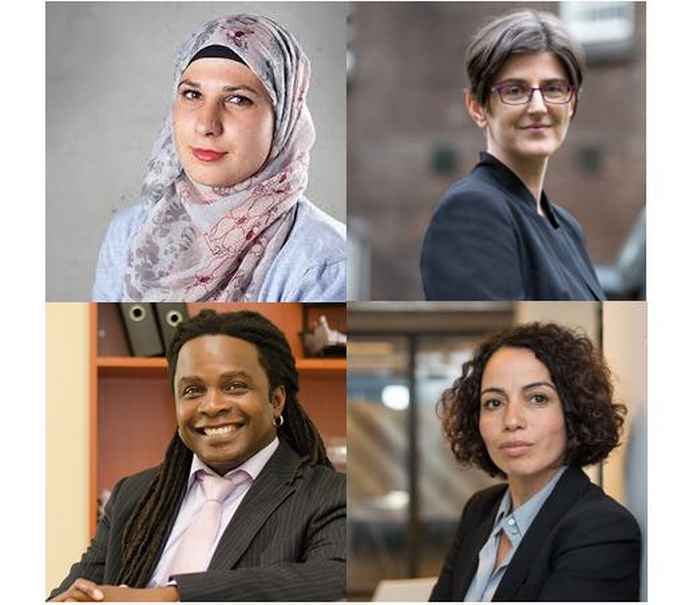Institutional racism and academia
24 June 2020

Tasniem Anwar (PhD candidate at the Political Science department), Sarah Bracke (professor of Sociology of Gender and Sexuality), Francio Guadeloupe (senior university lecturer of Anthropology) and Amade M'charek (professor of Anthropology of Science) all study the issue of racism or related issues in their work. They discussed institutional racism, what strategy we should adopt and how to tackle racism in higher education and science.
What is institutional racism?
Institutional racism isn't just a subsection of racismSarah Bracke
Francio Guadeloupe: 'Well said! One of the main drivers of racism is our way of looking at the world and how this perspective is shaped by our shared colonial history. In order to understand the world, we rely on certain institutions. These include conventional institutions such as schools, museums, statistics agencies, governmental organisations, religious groups, social movements, think tanks and universities, as well as less obvious institutional entities such as children's books, newspapers, laws, scientific publications and TV programmes. This institutional landscape has helped explain the world to us and socialise us since the 16th century, splitting up the world into racial continents: Africa (black), Europe (white), America (red), etc.'
Racial categories are nonsenseFrancio Guadeloupe
Amade M'charek: 'I agree, and while there are of course individual persons who are or act racist and people who think they are better than others, this isn't what makes racism such a serious problem that is so difficult to eradicate. I think that it's a mix of three different elements. Firstly, there is a long history of racial science and its subsequent legacy – the concept of race – which haunts every aspect of our society. This is sometimes intangible, while at other times it is all too concrete. Despite science incessantly showing that race does not exist, it continues to have a massive impact on how we perceive reality.'
Categories tend to become stickyAmade M'charek
Amade M'charek: 'Secondly, institutional racism involves the perpetuation of deep-rooted historic inequality and hierarchies. This not only involves inequality within our societies, but also the reproduction of colonial relationships between Europe and Africa, Western Europe and Eastern Europe, etc. The third element is the categories we use to order, and, in order to organise our reality. Categories tend to become sticky through language and other expressions, and many materialise in technologies and bureaucratic procedures. They thus occupy our view to such an extent that, eventually, we are no longer able to look past them. Scientists are also partly responsible for the existence of these categories, as we create them in order to describe people, such as statistical probabilities about 'delinquent Moroccan youths' or 'Eastern European criminal gangs'. As a result, these categories have now become concrete reality at the political level as a means of describing a whole host of new social issues and problems.'
How can you use science to tackle racism?
Tasniem Anwar: 'I think it's particularly important to ask each other how racism works close to home and at our university and what we can do about it. These can be uncomfortable conversations, but they are necessary uncomfortable conversations.
'The UvA is working hard on the issue, e.g. via the Diversity Committee, via organisations like Amsterdam United and the University of Colour and through the efforts of the many students and staff who have done their best to claim their place at the UvA and make every part of the university more inclusive. This good work deserves to be recognised.'
If we fail to recognise racism as an institutional problem, the debate will remain superficialTasniem Anwar
We are not in the business of describing people, but of making up peopleCanadian philosopher Ian Hacking
Don't just think of diversity policy as a matter of ticking the right boxes.Tasniem Anwar
Tasniem Anwar: 'We should also consider the political consequences of how the diversity debate is being conducted and interpreted. For example, if efforts to promote diversity are simply seen as a matter of trying to tick the right boxes, we miss the true importance of diversity, pay insufficient attention to the issue of inequality and sidestep the awkward conversations that need to be held. We should study the work of academics like Prof. Gloria Wekker, Prof. Philomena Essed, Prof. Gurminder K. Bhambra and many others, in addition to acknowledging the practical efforts that have already been made to boost diversity at the university.'
Institutional inequality is approached very differently when it comes to raceSarah Bracke
A new critical massSarah Bracke
Sarah Bracke: 'There's so much that needs to be rethought, including the policy that will make our institutions more inclusive and dismantle institutional racism. In this sense, the renewed attention for the issue of institutional racism sows the seeds of hope: hope that a new – and young – critical mass has been reached that will continue to exert pressure until the currently white university has sufficiently transformed itself.'